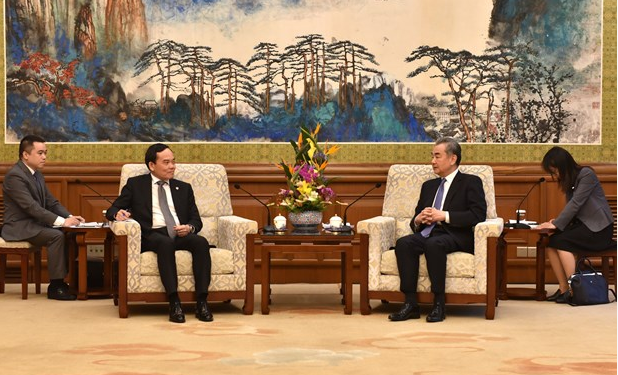 Politics & Law
Politics & Law

 |
| Deputy PM Trần Lưu Quang (L) and Chinese Foreign Minister Wang Yi. VNA photo |
BEIJING – Deputy Prime Minister Trần Lưu Quang, Chairman of the Việt Nam Sub-Committee in the Việt Nam-China Steering Committee for Bilateral Cooperation, had a meeting with Wang Yi, Chairman of the China Sub-Committee in the Việt Nam-China Steering Committee for Bilateral Cooperation, in Beijing on April 8.
Wang Yi is also member of the Political Bureau of the Communist Party of China (CPC) Central Committee, Director of the Office of the CPC Central Committee’s Commission for Foreign Affairs, and Minister of Foreign Affairs of China.
The meeting took place during National Assembly Chairman Vương Đình Huệ’s ongoing visit to China.
Both sides engaged in in-depth discussions on their bilateral relationship, global and regional issues of shared concern, and agreed to effectively implement the joint statement on further deepening and elevating the comprehensive strategic cooperative partnership between the two countries, and building a Việt Nam-China community with a shared future that carries strategic significance in line with six major directions agreed upon by high-ranking leaders of the two Parties and countries.
They also agreed to effectively carry out high-level exchanges and meetings across various sectors, and further uphold the role of the Bilateral Cooperation Steering Committee in monitoring the progress of realising high-level common perceptions.
The meeting highlighted cooperation in national defence and security, with a focus on strengthening strategic connectivity through railway and road infrastructure projects. The two sides vowed to expedite the opening, upgrading, and recognition of border gates and discussed piloting the construction of smart border gates to facilitate Vietnamese goods transit by rail through China to third countries via the Asia-Europe railway.
They will increase locality-to-locality and people-to-people exchanges to solidify social foundation, and maintain coordination on global and regional issues of mutual concern. At the same time, the two countries will work closely together on border management and protection in accordance with the three legal documents on land border and control of differences at sea in line with the 1982 United Nations Convention on the Law of the Sea (UNCLOS). VNA/VNS




